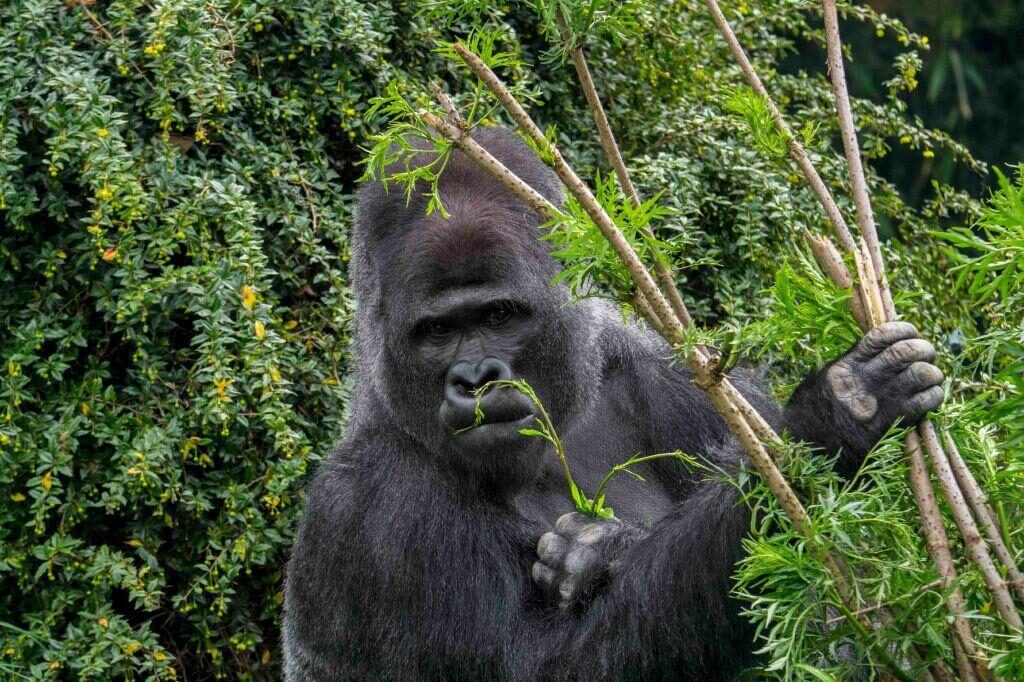Libreville, Gabon – Gorillas wandering through the dense rainforests of Gabon may hold the key to future medical breakthroughs. With every leaf they chew, these majestic creatures tap into an ancient knowledge—one that intertwines with the survival of both their kind and, perhaps, ours. Scientists studying the self-medication practices of wild gorillas have uncovered promising insights into how these animals may guide us toward new treatments for some of the world’s deadliest diseases.
Researchers from Gabon and the United Kingdom have been following the dietary habits of western lowland gorillas in the lush Moukalaba-Doudou National Park. Their attention focused on certain medicinal plants, long revered by local healers, that these gorillas consumed regularly. Among these, four species—Ceiba pentandra, Myrianthus arboreus, Milicia excelsa, and Ficus—stood out, not just for their place in the gorilla diet but for their potential medicinal properties.
Gorilla Wisdom: A Gateway to Medical Breakthroughs
While many large primates are known to self-medicate, the practices of gorillas could be especially valuable in the fight against modern health threats. These magnificent animals selectively eat plants that are rich in antioxidants and antimicrobials, a natural pharmacy that could benefit not only their well-being but also ours.
The bark of these trees, cherished by traditional healers to treat ailments ranging from stomach pains to infertility, contains powerful chemicals such as phenols and flavonoids. Scientists have discovered that these compounds exhibit remarkable antibacterial activity, especially against multi-drug resistant strains of E. coli, a common and often dangerous pathogen. Among the four plants, Ceiba pentandra—known for its towering stature in African forests—demonstrated the strongest effect against all bacterial strains tested.
Local Knowledge Meets Modern Science
The knowledge of local healers has long been an invaluable resource, guiding the scientific community toward potential medical discoveries. Gabon, one of the most biodiverse regions on the planet, remains largely unexplored in terms of its botanical wealth. The traditional use of Ceiba, alongside other plants, offers a glimpse into the untapped treasures of this region’s flora, a richness that has yet to be fully studied.
The findings of this study, which relied on interviews with local healers and careful observation of gorilla feeding habits, serve as a reminder of how much we still don’t know about the world’s rainforests. As Joanna Setchell, an anthropologist from Durham University in the UK, noted, “This suggests that gorillas have evolved to ingest plants that benefit their health, and it highlights the vast gaps in our understanding of Central African rainforests.”
A Future Shaped by Gorillas’ Ancient Wisdom
The promise of these discoveries comes at a time when the survival of the western lowland gorilla itself is under threat. Poaching and diseases such as Ebola have decimated their populations, and these gentle giants are now classified as critically endangered by the International Union for Conservation of Nature (IUCN). Protecting their habitats not only ensures their survival but could also safeguard the vital medical knowledge they unknowingly carry.
Gabon’s forests, home to elephants, chimpanzees, and gorillas, remain a vast green sanctuary for both wildlife and potential cures yet to be discovered. As scientists delve deeper into the self-medicating habits of gorillas, they open the door to new opportunities for human medicine, demonstrating how the ancient wisdom of these creatures may shape the future of health care.
Conclusion: Harnessing Nature for a Healthier Tomorrow
While the future is uncertain for the western lowland gorilla, the lessons they teach us about self-medication could prove invaluable. From their selective consumption of Ceiba bark to their reliance on forest resources for survival, gorillas offer an unprecedented opportunity to bridge the gap between traditional knowledge and modern science. As we continue to study their habits, we may uncover the secrets that could one day revolutionize the treatment of superbugs and other health challenges.
The forests of Gabon stand as both a beacon of hope and a reminder of the delicate balance we must preserve. In the silent shadows of these forests, gorillas hold the answers—if only we continue to listen.


